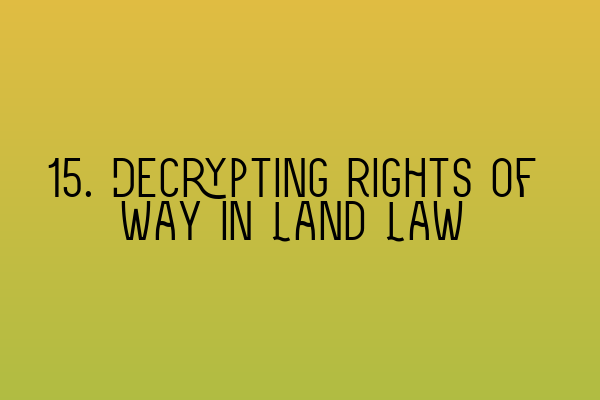Decrypting Rights of Way in Land Law
Welcome to another insightful blog post from SQE Property Law & Land Law. Today, we will be unraveling the mysteries surrounding rights of way in land law. Whether you are a property owner, a solicitor, or simply someone interested in understanding the intricacies of land law, this article will provide you with the knowledge you need. So, let’s dive in!
Understanding Rights of Way
Rights of way are legal easements that grant individuals or entities the right to pass through someone else’s property. These rights can be either public or private, and they are essential to ensure the smooth functioning of our society. However, deciphering the complexities of rights of way can be quite challenging without the guidance of a knowledgeable solicitor.
To begin with, it’s important to differentiate between two types of rights of way: public rights of way and private rights of way.
Public Rights of Way
Public rights of way are pathways that everyone has the legal right to access. They are often marked by signposts or footpath symbols and can include footpaths, bridleways, and byways open to all traffic (BOATs). Public rights of way are crucial for maintaining connectivity between communities and ensuring access to public spaces, such as parks and beaches.
If you have encountered public rights of way during your daily walks or hikes, you might have wondered about the rules and restrictions associated with them. Well, the good news is that public rights of way are governed by specific legislation, ensuring that access is maintained and any obstructions or disputes are appropriately dealt with.
To learn more about the legislation surrounding public rights of way, check out our related article on SQE 1 Practice Exam Questions.
Private Rights of Way
On the other hand, private rights of way are access rights granted to specific individuals or entities. These rights are typically established through legal agreements, such as deeds or contracts, and are specific to the parties involved. Private rights of way can be essential for landlocked properties, granting the necessary access to nearby roads or other properties.
Understanding the intricacies of private rights of way requires a deep understanding of land law and the legal procedures involved in establishing such rights. Without proper legal guidance, property owners and developers may find themselves entangled in disputes and legal battles.
For a comprehensive understanding of private rights of way and the legal processes involved, we recommend checking out our related article on SQE 1 Practice Mocks FLK1 FLK2.
Resolving Disputes
Unfortunately, disputes can arise concerning rights of way, leading to conflicts between property owners and users, which can be both time-consuming and costly. To resolve disputes efficiently, it is crucial to seek legal advice and guidance from experienced property law solicitors.
At SQE Property Law & Land Law, our team of dedicated solicitors specializes in resolving rights of way disputes. We have an in-depth understanding of the relevant legislation and case law, allowing us to provide tailored solutions to our clients. With our expertise, we aim to minimize the impact of disputes and help parties reach agreeable resolutions.
If you find yourself in a rights of way dispute or require legal guidance regarding rights of way, we are here to help. Contact our expert solicitors today to discuss your situation and explore the best course of action.
Conclusion
Rights of way are a crucial aspect of land law, ensuring access and connectivity for individuals and communities. Whether public or private, these rights can be complex and require careful navigation to avoid disputes.
By seeking the guidance of experienced solicitors specializing in property law, such as SQE Property Law & Land Law, you can decrypt the complexities surrounding rights of way and ensure a smooth legal process.
If you want to gain a deeper understanding of property law and land law, we recommend exploring our related articles on SQE 2 Preparation Courses and SQE 1 Preparation Courses.
Stay informed, stay empowered!
[Contact information for SQE Property Law & Land Law]
